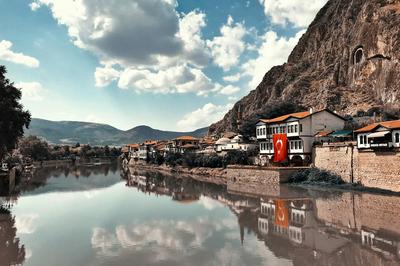How to Buy Real Estate in Thailand with Crypto
Guide for investors, frequent travelers, and remote buyers
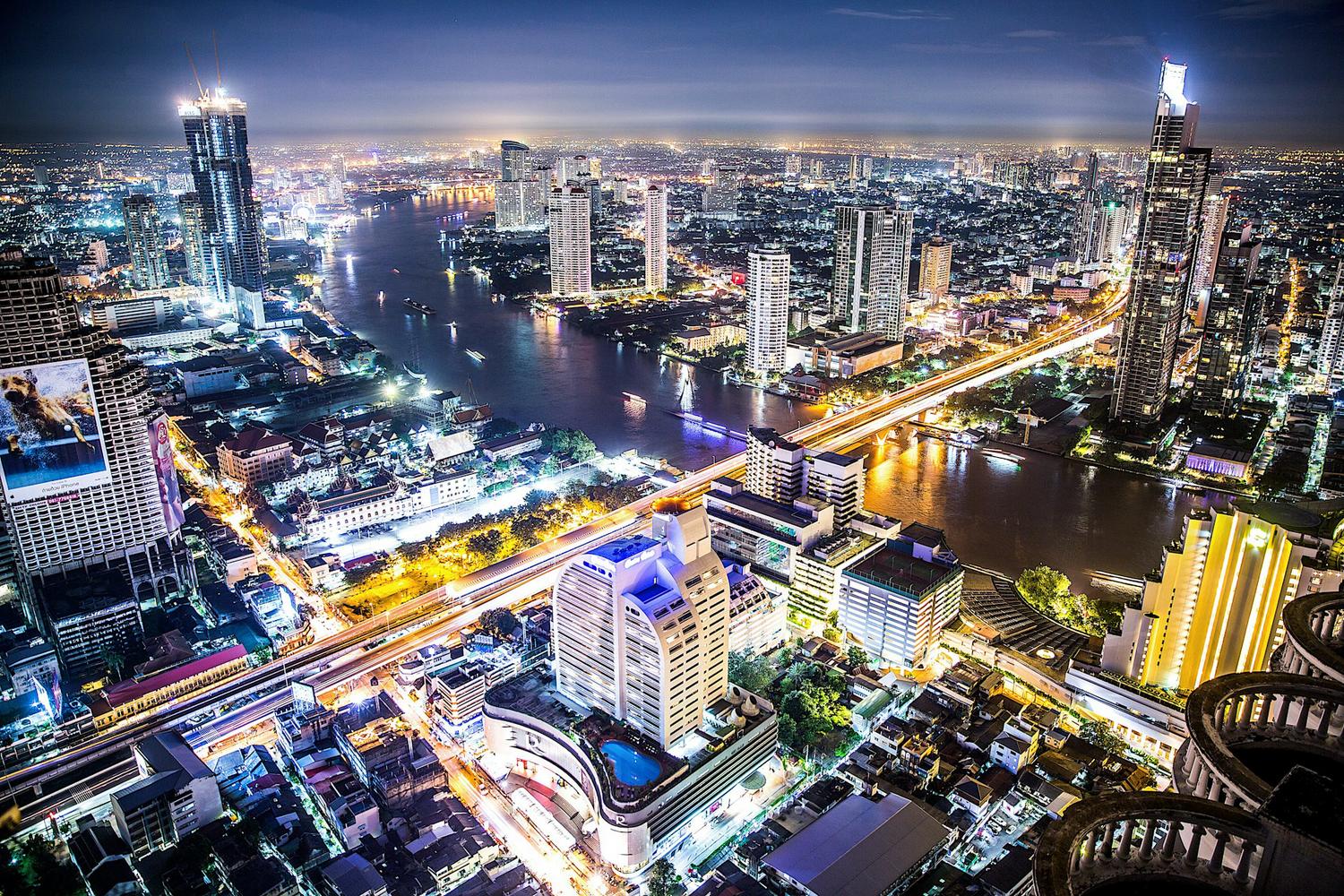
Thailand is one of the most attractive destinations in Southeast Asia for real estate investment. The country combines low entry prices with strong tourism demand and high rental yields. In cities like Bangkok, Phuket, and Pattaya, short-term rentals are in constant demand — and prices for well-located properties keep rising. Small apartments start at around $100,000, and private villas from $350,000. In tourist areas, rental returns range from 5% to 10% annually — and can be even higher in some cases. Major developers like Sansiri and AssetWise accept Bitcoin, Ethereum, and USDT for property purchases.
With 1tab, you can easily convert large crypto sums and settle the deal in Thai baht — legally and with full compliance. If you want to buy property in Thailand with crypto fast, safely, and with low commission, use 1tab. Contact our manager below to learn more.
Is It Possible to Buy Real Estate in Thailand with Crypto?
Yes. Thailand allows private individuals to buy property using cryptocurrency, as long as the transaction is converted into Thai baht (THB) during the process. You cannot register ownership directly in crypto, but you can legally use it as a means of payment through an approved exchange or intermediary like 1tab.
Thailand regulates crypto under the Digital Asset Business Act, and crypto is considered a digital asset, not legal tender. However, real estate developers and licensed OTC desks can legally accept crypto and convert it into fiat before finalizing a property sale.
Advantages of Buying Real Estate with Crypto in Thailand
Buying property in Thailand with cryptocurrency offers several key benefits:
Fast international settlement. Crypto transactions can avoid SWIFT delays and are usually completed in hours instead of days or weeks.
Lower fees. For large transactions (typically $50,000+), crypto payments can carry lower fees than traditional banking routes.
No capital controls. You can move large amounts of crypto internationally. Thailand allows foreign buyers to transfer unlimited funds from abroad, including cryptocurrency, without restrictions. While property registration requires the funds to be converted into Thai baht with a Foreign Exchange Transaction (FET) form, this process is standard and doesn’t limit the amount transferred.
Privacy and convenience. Using cryptocurrency allows buyers to avoid disclosing sensitive banking details and navigating complex international banking procedures. This can be especially helpful for long-term crypto holders who want to diversify without converting assets early. While transactions still require basic KYC/AML verification for legal compliance, crypto enables a smoother, more discreet process compared to traditional wire transfers, giving buyers more control over timing, currency conversion, and financial footprint.
Are There Any Restrictions on the Real Estate You Can Buy in Thailand?
Thailand has clear rules for foreign buyers, but there are legal pathways to owning property.
What foreigners can buy
Condominiums (Freehold). Foreigners can legally own condo units with a freehold title, as long as foreign ownership in the building does not exceed 49% of the total floor area. To register ownership, funds must be transferred from overseas in foreign currency with a Foreign Exchange Transaction (FET) form.
What foreigners cannot own directly
Land and standalone houses. Foreigners are prohibited from owning land in their personal name under the Land Code Act. This includes houses built on land, unless structured through alternative legal arrangements.
Legal ownership structures available:
Leasehold. You can lease land or property for up to 30 years, with renewable terms.
Superficies & Usufruct. Foreigners may own structures on Thai land or use it long-term via surface rights agreements.
Thai Company Ownership. Land can be owned through a Thai-registered company, but the company must have at least 51% Thai shareholder control to be lawful — and this must not be a nominee setup. Legal guidance is crucial.
Investment Exceptions. In rare cases, foreign investors may receive approval to buy land directly if they invest 40 million THB or more, but this involves complex approval processes via the BOI (Board of Investment).
Three Ways to Buy Property in Thailand with Crypto
Freehold Condominium Ownership
For foreign buyers, condominiums offer the most transparent and internationally recognized form of ownership in Thailand. These properties often come with ready-to-rent furniture packages, making them attractive for short-term rental income through platforms like Airbnb.
Ownership includes a Chanote title deed, offering clear legal status and easier resale compared to leasehold assets. Many condos are located in mixed-use developments with hotel-grade amenities — pools, gyms, concierge, co-working lounges — increasing both lifestyle appeal and rental demand. Some developers now allow the full purchase process online, including crypto payment through integrated exchanges, legal documentation, and remote registration.
With 1tab, you can easily convert your crypto into Thai baht and send it directly to your developer or agent. We help simplify the transaction process, ensure legal compliance, and assist with smooth cross-border transfers — even for large amounts.
Through a Thai Company
A more complex structure that allows indirect land ownership. Foreigners can set up a Thai Limited Company, where they hold up to 49% of shares, and Thai nationals hold the majority. The company can legally own land and buildings, but it must be genuinely structured — nominee arrangements are illegal. Requires annual accounting, tax filings, and compliance with Thai corporate law.
In Leasehold Ownership
A legal and common method in resort areas like Phuket, Samui, and Pattaya. Foreigners can lease land for up to 30 years, with options to renew for additional terms. The building on the land can be owned outright by the leaseholder. Lease agreements must be registered at the Land Department if longer than 3 years. Crypto payments are allowed, but the lease contract must specify the value in THB. Often combined with superficies or usufruct rights to strengthen control over the property.
Most Popular Locations in Thailand to Buy Real Estate
Bangkok
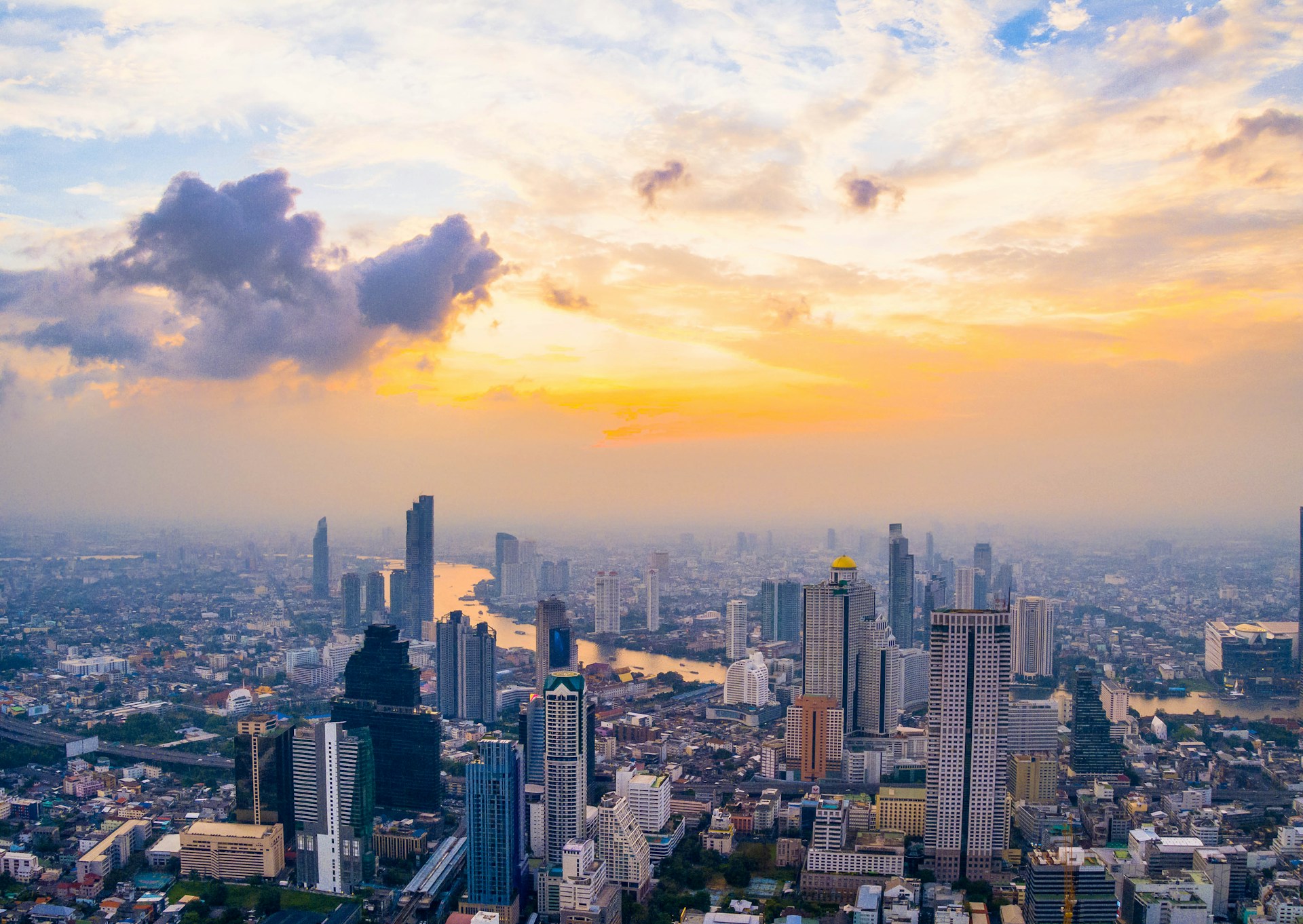
Bangkok is Thailand’s capital and largest city, serving as the country’s economic, cultural, and transportation hub. As of 2025, its metropolitan population exceeds 11.39 million people, with over 32.4 million international visitors recorded in 2024 — making it one of the most visited cities in the world.
Property prices in prime districts such as Sukhumvit, Silom, Sathorn, and Phrom Phong average between ฿120,000–฿150,000 per square meter (~$3,450–$4,300) for new condominiums. The market has shown signs of recovery, with prices rising 4.5% year-over-year in 2024 and projected to grow by 5–7% in 2025, driven by foreign demand and infrastructure expansion.
Notably, districts with high rental yields include Huai Khwang, Chatuchak, and Phra Khanong, where gross annual yields range from 6.5% to 8.5%, especially for studio and 1-bedroom units.
Bangkok’s combination of strong tourism, growing expat population, and expanding transit infrastructure makes it a strategic destination for investors seeking both short-term rental income and long-term capital appreciation.
Phuket

Phuket is Thailand’s largest island and one of Southeast Asia’s top resort destinations. As of 2025, its population is approximately 455,000 people, with over 8,6 million international visitors recorded in 2024 — making it the second most visited destination in Thailand after Bangkok.
Property prices in prime areas such as Bang Tao, Kamala, Surin, and Layan average between ฿150,000–฿180,000 per square meter ($4,200–$5.000), depending on size, view, and proximity to the beach. Overall, Phuket’s real estate market is expected to grow 2–7% in 2025, with infrastructure-driven zones seeing up to 10–15% appreciation.
Rental yields remain strong, especially in tourist-heavy districts like Patong, Bang Tao, and Kamala, where short-term rentals generate 7–10% annually, and peak-season returns can reach 12%. Long-term rentals aimed at expats and digital nomads offer 5–8% yields, with stable occupancy throughout the year.
Phuket’s combination of resilient tourism, cash-driven property transactions, and limited coastal land supply makes it a strategic choice for investors seeking high-yield rental income and long-term capital growth — especially in branded residences and resort-style developments.
Pattaya
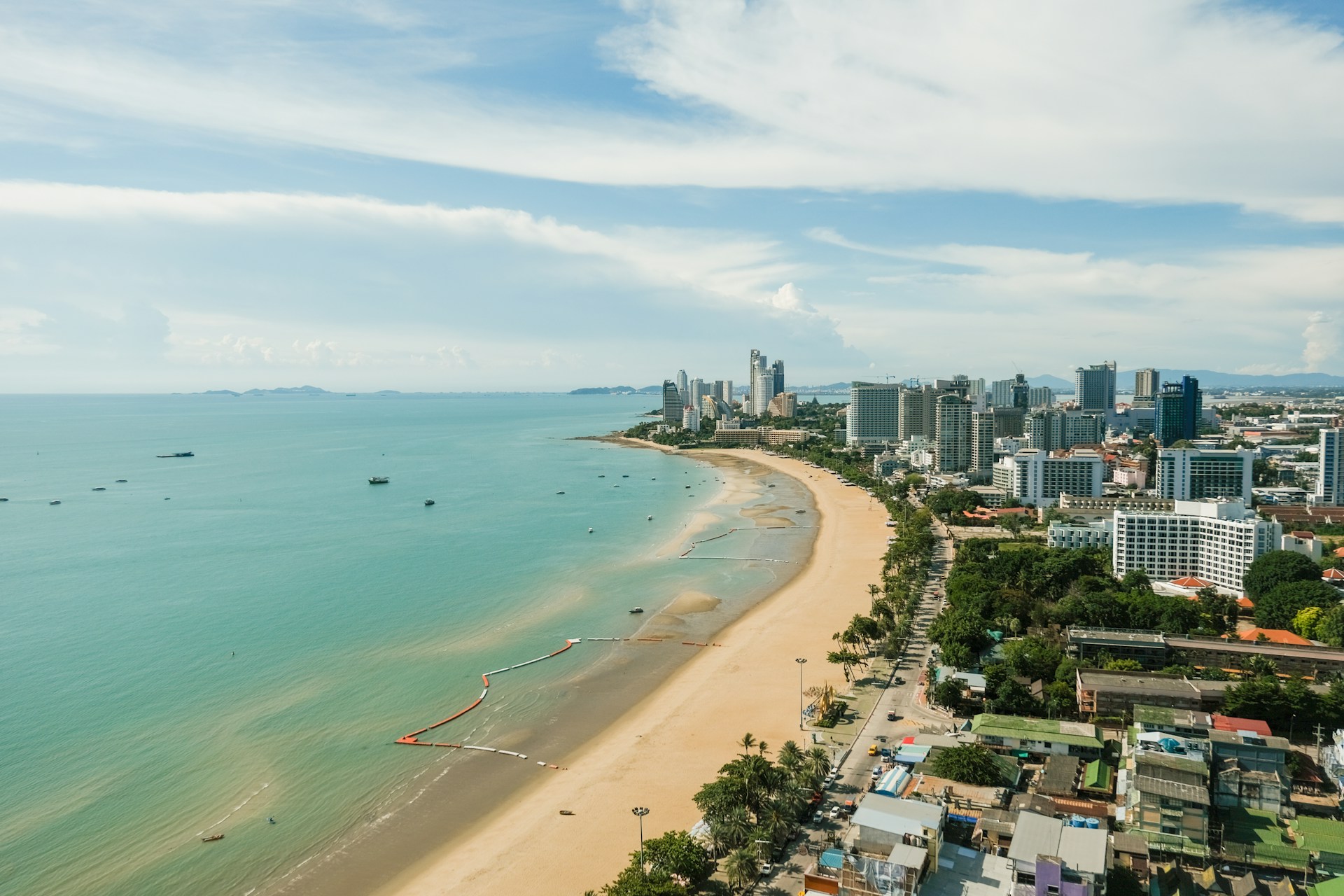
Pattaya is one of Thailand’s fastest-growing coastal cities, known for its tourism, affordability, and rising real estate demand. As of 2025, its population is approximately 104,000 people, including a large expat and retiree community. Pattaya welcomed over 10 million international visitors in 2024, making it one of the most visited resort cities in Southeast Asia.
Property prices in prime areas such as Jomtien Beach, Wongamat, Pratumnak Hill, and Central Pattaya range from ฿90,000 to ฿130,000 per square meter ($2,500 — $3,600), while luxury penthouses can reach ฿10 million (~$290,000). Beachfront properties sell for 20%+ more than inland units. Overall, prices have risen 5% year-over-year, with continued growth expected due to infrastructure expansion and foreign demand.
Rental yields are among the highest in Thailand, especially in Jomtien and Bang Lamung, where gross annual yields reach 7.7% to 8.3%. Short-term rentals during peak season can generate up to 10%, while long-term leases for retirees and digital nomads offer 5–7% returns.
Pattaya’s combination of affordable entry prices, strong rental returns, and major infrastructure projects — including the Eastern Economic Corridor (EEC) and high-speed rail to Bangkok — makes it a top choice for investors seeking both income and long-term appreciation.
Chiang Mai
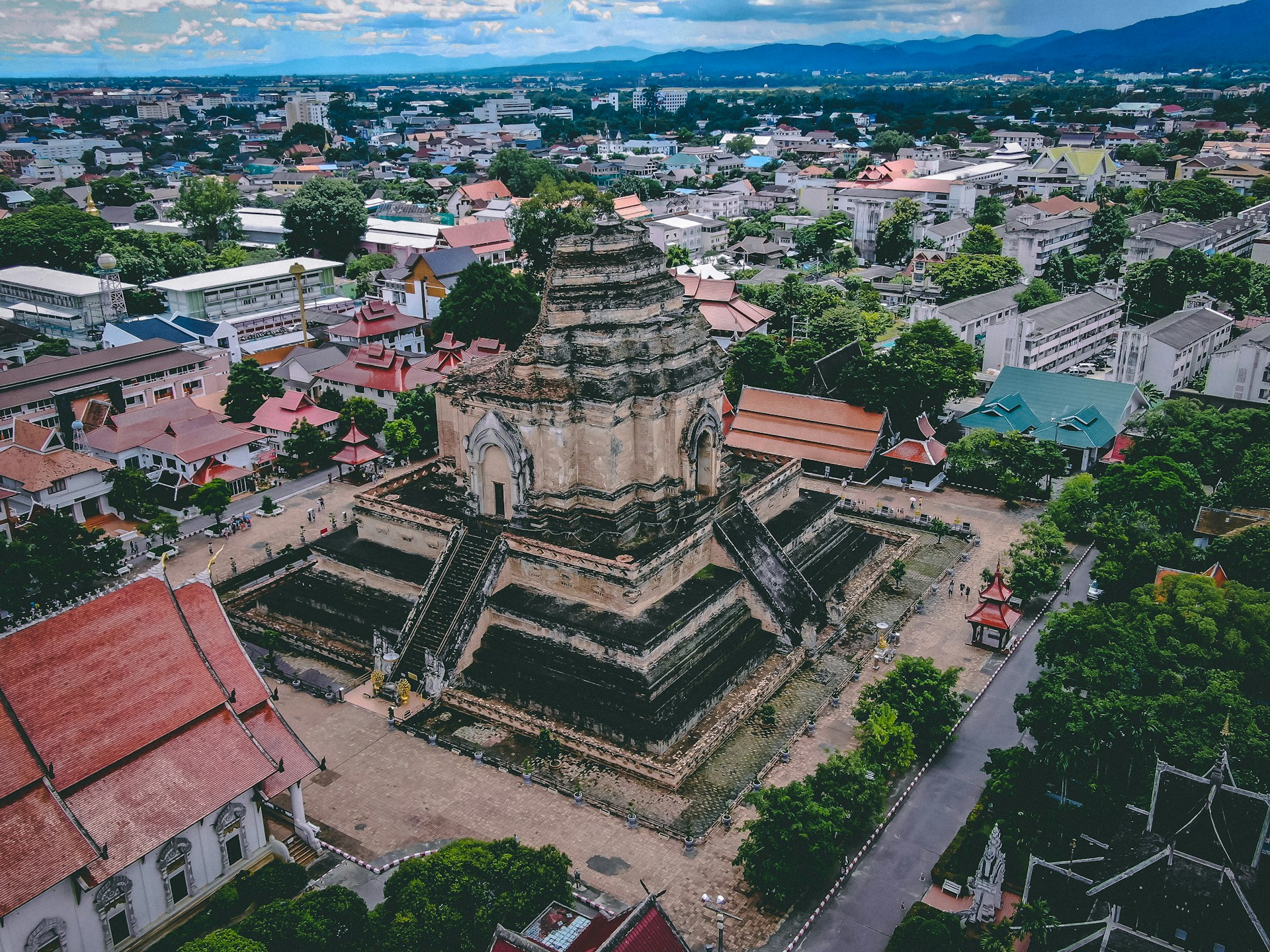
Chiang Mai is Thailand’s second-largest city and a key destination for tourism, lifestyle, and investment. As of 2025, its metro population is approximately 1.24 million people, with steady annual growth of around 1.25%. The city welcomed over 10 million tourists in 2024, generating 80 billion baht in tourism revenue, approaching pre-pandemic levels.
Property prices in central districts such as Nimmanhaemin, Old City, and Chang Phuak average around ฿76,751 per square meter (approx. $2,100 USD) for condominiums. Prices have increased 10% year-over-year in prime areas, with suburban houses seeing 5% growth. Since 2020, condo prices have risen by over 50%, reflecting strong demand from both domestic and foreign buyers.
Notably, neighborhoods with high rental yields include Nimmanhaemin and Hang Dong, where annual returns range from 6% to 8%, driven by long-term expat tenants and digital nomads. Chiang Mai’s affordability, lifestyle appeal, and growing infrastructure—such as the planned light rail system—make it an attractive option for investors seeking stable rental income and long-term capital appreciation.
Koh Samui

Koh Samui is a premier island in southern Thailand, known for its tropical charm and growing appeal among international investors. As of 2024, the island’s population is approximately 68,300 residents, with seasonal fluctuations due to tourism. In 2024, Koh Samui welcomed over 3.5 million visitors, split evenly between domestic and international travelers. Tourism revenue continues to grow, supported by expanding infrastructure and luxury developments.
Property prices in prime areas such as Chaweng, Bophut, and Choeng Mon average around ฿150,000–200,000 per square meter (approx. $2,200 USD) for villas. Prices have increased 5–10% year-over-year, with beachfront properties appreciating even faster due to limited supply and high demand. Since 2020, villa prices have surged by over 30%, especially in sea-view and luxury segments.
Rental yields in Koh Samui range from 6% to 8%, with top-performing areas including Choeng Mon, Bophut, and Lamai. Short-term rentals via platforms like Airbnb are highly profitable during peak seasons, while long-term rentals cater to expats and digital nomads. The island’s combination of high occupancy rates, rising property values, and favorable tax structures makes it a compelling choice for investors seeking passive income and long-term capital growth.
Hua Hin
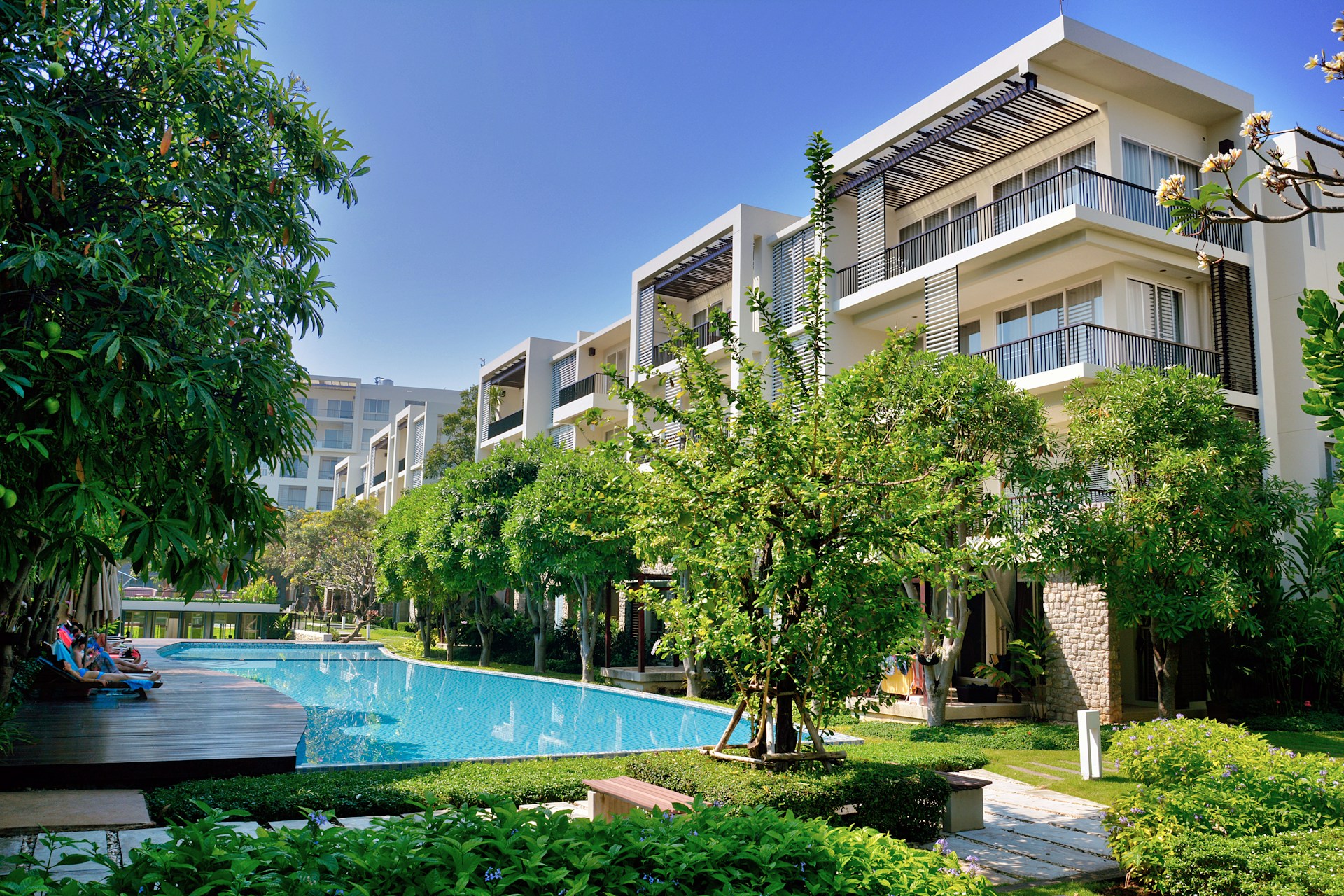
Hua Hin is a coastal city in Prachuap Khiri Khan Province, known for its laid-back charm, royal heritage, and growing appeal among domestic and international investors. As of 2025, the city’s population is approximately 85,099 residents, with seasonal increases due to tourism. In 2024, Hua Hin welcomed over 11 million visitors, generating 44 billion baht in tourism revenue—a strong rebound that reflects its enduring popularity.
Property prices in prime areas such as Khao Takiab, Hua Hin City Center, and Palm Hills average around ฿87,400 per square meter (approx. $2,400 USD) for condominiums. Luxury beachfront developments like InterContinental Residences and Sasara Hua Hin command prices up to ฿254,000 per square meter, with some units reaching ฿280,000. Prices have risen 3–7% annually, with beachfront condos appreciating over 35% since 2020.
Rental yields in Hua Hin range from 4% to 7%, with short-term vacation rentals and long-term expat leases driving demand. High-performing areas include Khao Takiab, Black Mountain, and downtown Hua Hin, where occupancy rates for Airbnb-style rentals hover around 40%, and average daily rates reach $100. Villas and condos near hospitals, golf courses, and international schools are especially attractive to retirees and digital nomads.
Hua Hin’s combination of affordable luxury, strong rental returns, and infrastructure upgrades—including airport expansion and a planned high-speed rail link to Bangkok—make it a compelling destination for investors seeking stable income and long-term capital growth.
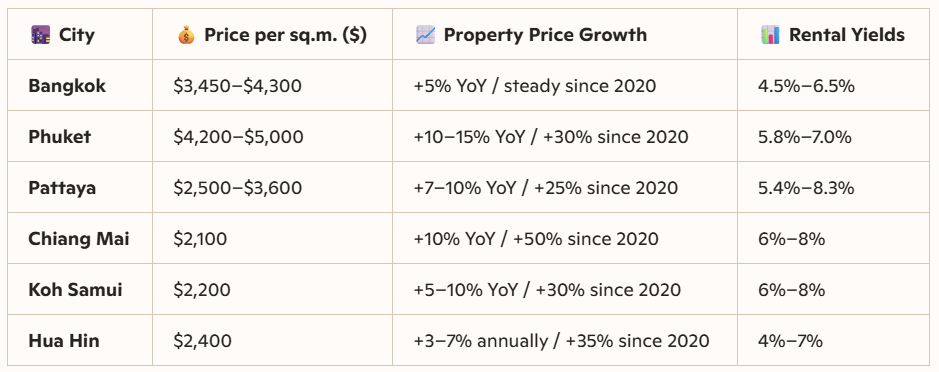
Thai Crypto-Friendly Developers
Thailand is becoming increasingly crypto-friendly, especially in popular areas like Phuket and Pattaya. Major developers now accept digital assets for property purchases. For example, SC Asset works with Bitkub and supports payments in Bitcoin, Ethereum, and USDT. Sansiri allows crypto deals through licensed platforms like XSpring Digital and Bitazza. Developers handle conversion through regulated OTC desks.
1tab helps crypto holders buy property in Thailand with minimal friction — whether you’re using stablecoins or major coins like BTC.
Buying Thai Property with Crypto in Steps
Buying real estate in Thailand with crypto is possible, legal, and increasingly popular. Here’s how the process works step by step, and how 1tab can help you handle everything smoothly.
Choose the Property. Select a condo, house, or villa available to foreign buyers.
Confirm Crypto Payment. Make sure the seller or developer accepts crypto — directly or through a trusted OTC partner. All deals involve conversion to Thai Baht before payment.
Verify and Negotiate. Agree on the price and terms.
Convert Crypto to Thai Baht. Use a regulated OTC desk or exchange to convert crypto to fiat. The funds are then sent to the seller via local bank transfer, with full documentation linking crypto to the purchase.
Prepare Legal Documents. To own a freehold condo, you’ll need to send foreign currency to Thailand and get a Foreign Exchange Transaction (FET) form from a Thai bank.
Complete the Transaction. Make the final payment and sign the contract. Register the property at the Land Department with help from a licensed lawyer or agent. Expect 6–7% in taxes and fees.
1tab simplifies the whole process:
converts your crypto to Thai Baht legally,
handles KYC and compliance,
provides proof-of-funds for your lawyer and bank,
ensures funds are traceable and accepted for property registration.
Which Documents Do You Need to Buy Property?
To buy real estate in Thailand, you’ll need to prepare a standard set of documents:
Title Deed (Chanote), the main document confirming ownership.
Sale and Purchase Agreement (SPA), a purchase and sale agreement, signed after making a deposit.
FET form, confirmation of the transfer of foreign currency from abroad (required for registration of a freehold).
Land Office paperwork, includes forms Tor Dor 21 or Chor 21, depending on the type of property.
Tax forms for calculating transfer fee, stamp duty, and withholding tax.
Power of Attorney (POA): if you make a deal through a representative, it must be notarized and apostilled.
Notarization isn’t required, but all document copies must be signed as true, and everyone named on the deed must sign the agreement.
At this stage, the buyer usually pays a deposit — often 20–30% of the price in Bangkok, and slightly higher in other regions.
Which Cryptocurrencies Are Accepted for Buying Real Estate in Thailand?
Not all coins are accepted, so it’s important to check what each developer or broker supports. Here are the most common options:
Bitcoin (BTC), Ethereum (ETH), and Tether (USDT) are the most commonly used in property deals. Major developers like Sansiri, AssetWise, Origin, Ananda, and SC Asset accept them through licensed partners.
USDC, BNB, and SOL may also be accepted, but it depends on the developer and their crypto exchange partners. Platforms like Bitkub and XSpring Digital support USDC and BNB, but not all projects are connected to them.
Are There Any Taxes on Real Estate Operations with Crypto?
Taxes are the same as with fiat purchases. When buying:
transfer fee: 2% of property value;
stamp duty or business tax: 0.5–3.3% depending on seller’s status;
withholding tax: 1% for individual sellers.
Crypto is converted to fiat before the sale, so you are taxed based on the THB sale price, not the crypto itself.
Since January 1, 2025, Thailand offers a tax exemption on crypto capital gains if the conversion is processed through an SEC-licensed exchange or OTC provider. That means you won’t be taxed on profits from selling crypto as long as you use a compliant channel. The only taxes that apply relate to the real estate transaction itself, calculated in Thai baht.
Can I Get a Mortgage to Buy Property for Cryptocurrency in Thailand?
Foreigners cannot get a mortgage in crypto. Thai banks do not currently issue mortgages to foreigners in cryptocurrency or on crypto-backed assets. Most crypto buyers use full cash payment.
Traditional mortgage financing is available only in Thai baht, and typically requires a work permit, income from a Thai employer, and local credit history.
As of 2024–2025, some private platforms have started offering crypto-backed loan options — but these are usually limited to Thai residents and do not extend to foreign buyers. Such loans may use BTC, ETH, or stablecoins as collateral, but they are not issued by banks and are subject to strict conditions.
For now, foreign buyers using cryptocurrency typically convert crypto to fiat and purchase the property outright without financing. The transaction is handled like a standard cash sale in THB, often via OTC conversion channels.
Can I Process the Transaction Remotely?
Yes. Most property deals in Thailand can be handled remotely with the power of attorney. Here’s how.
View properties online. Virtual tours, live video calls, and detailed listings are available from most agencies, making it easy to select a property without being there physically.
Sign documents digitally or via courier. Electronic signatures are legally recognized in Thailand under the Electronic Transactions Act. For official matters (like registration), you’ll typically need to send notarized and apostilled documents via courier.
Transfer funds via 1tab in crypto from abroad. 1tab offers OTC services that allow international buyers to convert cryptocurrency to Thai baht. Be aware: For freehold registration, you’ll need a Foreign Exchange Transaction (FET) form confirming a fiat transfer from overseas.
Finalize registration without being in Thailand physically. By issuing a notarized Power of Attorney and submitting it through a local representative, you can register ownership at the Land Department remotely. This is a common method for foreign buyers purchasing condominiums.
Thailand is one of the easiest countries in Asia to buy real estate with crypto. You get access to modern properties, clear ownership options, and a growing number of developers who accept digital assets. If you’re ready to invest, 1tab will help you complete the deal safely and legally — from crypto conversion to property registration. Use our Telegram bot or contact a manager to get started.




